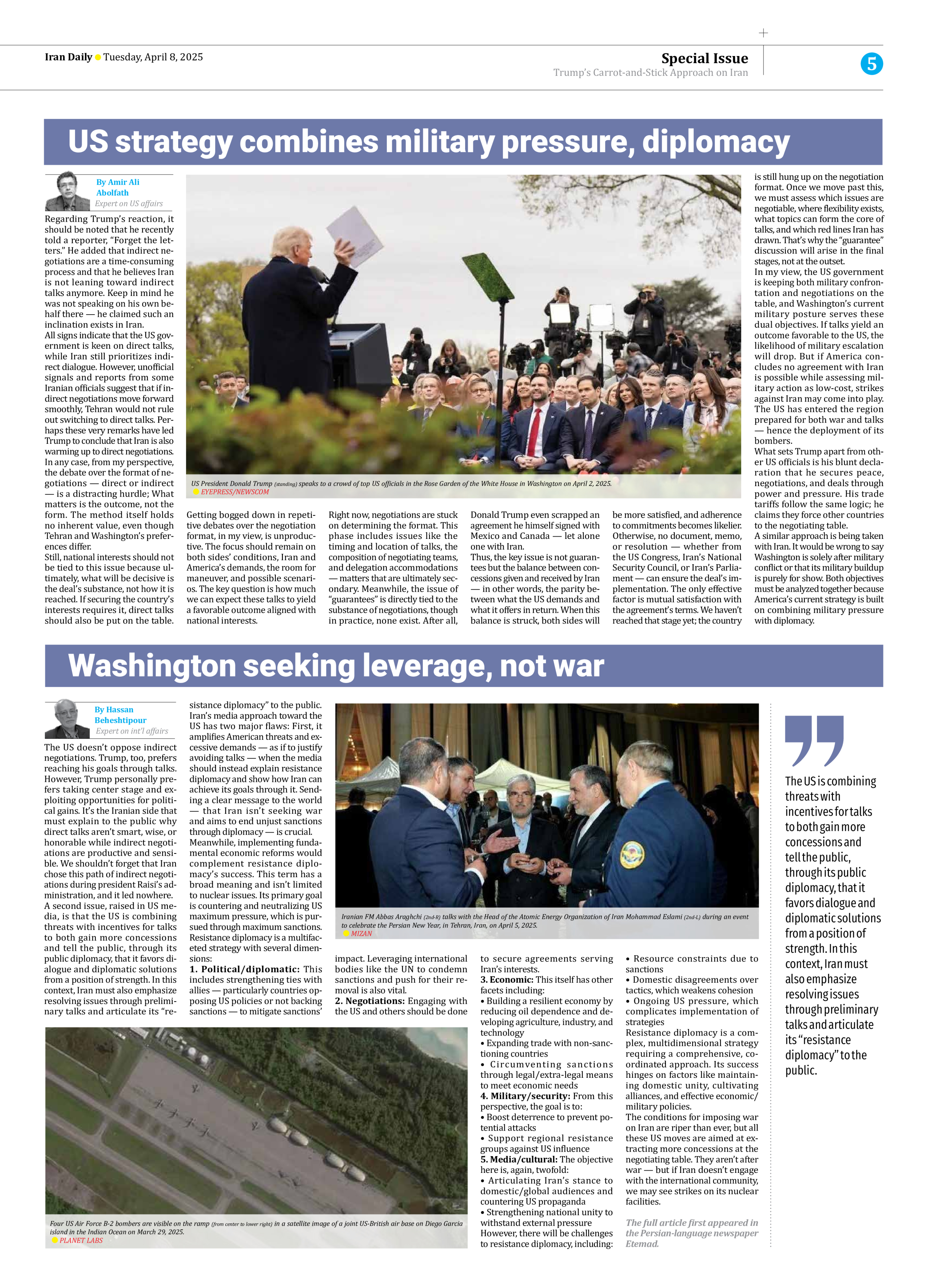
US strategy combines military pressure, diplomacy
By Amir Ali
Abolfath
Expert on US affairs
Regarding Trump’s reaction, it should be noted that he recently told a reporter, “Forget the letters.” He added that indirect negotiations are a time-consuming process and that he believes Iran is not leaning toward indirect talks anymore. Keep in mind he was not speaking on his own behalf there — he claimed such an inclination exists in Iran.
All signs indicate that the US government is keen on direct talks, while Iran still prioritizes indirect dialogue. However, unofficial signals and reports from some Iranian officials suggest that if indirect negotiations move forward smoothly, Tehran would not rule out switching to direct talks. Perhaps these very remarks have led Trump to conclude that Iran is also warming up to direct negotiations.
In any case, from my perspective, the debate over the format of negotiations — direct or indirect — is a distracting hurdle; What matters is the outcome, not the form. The method itself holds no inherent value, even though Tehran and Washington’s preferences differ.
Still, national interests should not be tied to this issue because ultimately, what will be decisive is the deal’s substance, not how it is reached. If securing the country’s interests requires it, direct talks should also be put on the table. Getting bogged down in repetitive debates over the negotiation format, in my view, is unproductive. The focus should remain on both sides’ conditions, Iran and America’s demands, the room for maneuver, and possible scenarios. The key question is how much we can expect these talks to yield a favorable outcome aligned with national interests.
Right now, negotiations are stuck on determining the format. This phase includes issues like the timing and location of talks, the composition of negotiating teams, and delegation accommodations — matters that are ultimately secondary. Meanwhile, the issue of “guarantees” is directly tied to the substance of negotiations, though in practice, none exist. After all, Donald Trump even scrapped an agreement he himself signed with Mexico and Canada — let alone one with Iran.
Thus, the key issue is not guarantees but the balance between concessions given and received by Iran — in other words, the parity between what the US demands and what it offers in return. When this balance is struck, both sides will be more satisfied, and adherence to commitments becomes likelier. Otherwise, no document, memo, or resolution — whether from the US Congress, Iran’s National Security Council, or Iran’s Parliament — can ensure the deal’s implementation. The only effective factor is mutual satisfaction with the agreement’s terms. We haven’t reached that stage yet; the country is still hung up on the negotiation format. Once we move past this, we must assess which issues are negotiable, where flexibility exists, what topics can form the core of talks, and which red lines Iran has drawn. That’s why the “guarantee” discussion will arise in the final stages, not at the outset.
In my view, the US government is keeping both military confrontation and negotiations on the table, and Washington’s current military posture serves these dual objectives. If talks yield an outcome favorable to the US, the likelihood of military escalation will drop. But if America concludes no agreement with Iran is possible while assessing military action as low-cost, strikes against Iran may come into play. The US has entered the region prepared for both war and talks — hence the deployment of its bombers.
What sets Trump apart from other US officials is his blunt declaration that he secures peace, negotiations, and deals through power and pressure. His trade tariffs follow the same logic; he claims they force other countries to the negotiating table.
A similar approach is being taken with Iran. It would be wrong to say Washington is solely after military conflict or that its military buildup is purely for show. Both objectives must be analyzed together because America’s current strategy is built on combining military pressure with diplomacy.







